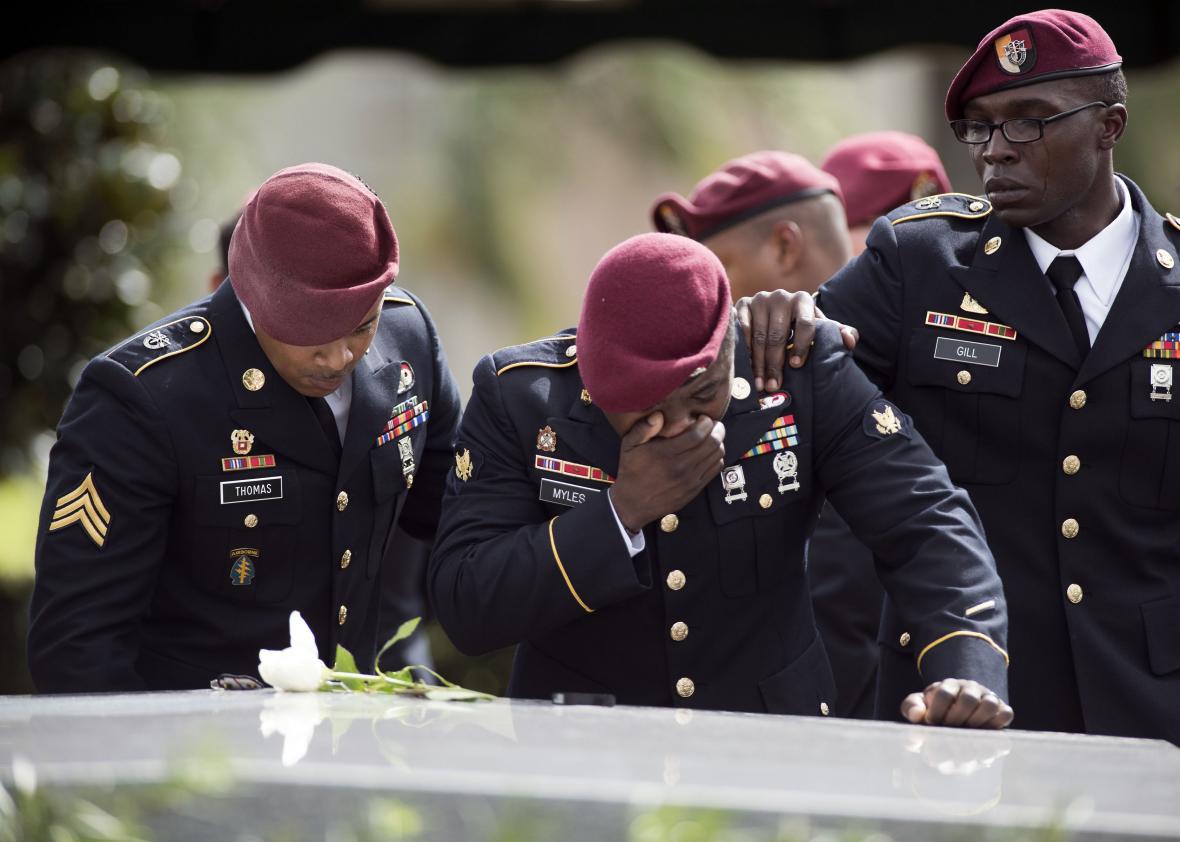The killing of four U.S. troops in Niger last month has changed the tenor of the debate on Capitol Hill over replacing the 2001 Authorization for the Use of Military Force, according to Sen. Tim Kaine. The post-9/11 measure has been used by three administrations as legal justification for military operations in more than a dozen countries against groups, including ISIS, that in some cases didn’t exist at the time it was passed.
The Virginia senator and former vice presidential candidate, a longtime advocate of repealing the AUMF in favor of a modernized, more tailored version, introduced a proposed replacement along with Sen. Jeff Flake back in May. Kaine says the debate is now gaining more interest from colleagues.
“The news from Niger caught people by surprise and made them think, Wow, this battle has moved pretty far afield from Iraq and Syria.” He told me in an interview on Tuesday. “I think there’s concerns that we’ve handed too much power over time to the president.”
Secretary of State Rex Tillerson and Secretary of Defense James Mattis testified before the Senate Foreign Relations Committee on Monday, arguing that the 2001 AUMF is sufficient and that replacing it with a time-limited one would embolden terrorist groups and undermine the confidence of allies.
“If this were the first day of a military action, that might be persuasive, but this is Year 17,” says Kaine, whose proposed AUMF includes a five-year sunset after which it would have to be reauthorized by Congress. “The notion of an open-ended forever war, I don’t think that was ever contemplated by the Framers of the Constitution,” he says.
Previous proposals to replace the authorization under the Obama administration ran aground over disagreements about whether it should include time limits, geographic locations, or restrictions on the type of tactics that can be used (e.g. “boots on the ground” in Syria).
“Jeff and I believe not only that there needs to be an authorization but that it’s really important that it be bipartisan. It wouldn’t be a good thing to send the message that one party supports action against ISIS but the other doesn’t,” Kaine says of his bill. One compromise from earlier versions he has proposed is that he’s no longer pushing for restrictions on the types of military activities that can be used. The current bill does identify the enemy in question—al-Qaida, ISIS, and the Taliban—and the countries where the battle is taking place: Afghanistan, Iraq, Syria, Somalia, Libya, or Yemen.
A major factor that allowed the 2001 authorization to grow into what it’s become today is the notion of “associated forces”—language not actually in the original authorization but added in subsequent interpretations by the executive branch. Groups like ISIS, al-Shabaab, and Boko Haram are fair game because the administration defines them, however loosely, as associated with al-Qaida.
“All three administrations have created an incredibly plastic definition of associated forces that has allowed basically this authorization to expand to the point that if you can call them a terrorist, you can pretty much take military action against them anywhere in the world,” he said. The new authorization would require the president to notify Congress of any new “associated persons or forces” being added to the list, subject to disapproval.
While Kaine supports fighting ISIS, he doesn’t believe there’s a legal rationale for the current campaign launched under Obama. Asked about the differences between the two administrations on this question, he says, “I don’t think that there’s much difference. With the Obama administration, they defined the 2001 AUMF very broadly; they certainly broadened it from the Bush administration’s definition. They used it narrowly. But I kept making the point to them, ‘Look there’s going to be a president who’s not as careful as President Obama and will take advantage of that, and that would not be a good legacy for you guys.’ That’s precisely what I worry about with [Trump].”
Kaine attributes the renewed interest in Congress’ military oversight role to Trump’s unpredictability. For instance, a separate bill introduced by Senate Democrats in recent days seeks to block Trump’s ability to launch a nuclear first strike against North Korea.
“President Trump is doing things that are pretty mercurial, pretty unpredictable. I think President Trump’s military strike against Syria was illegal,” Kaine says. “This president has already taken unilateral military action, and when we ask them what the legal justification is, they won’t tell us.”
Without a new AUMF, Kaine worries that “you basically just progressively creep, creep, creep toward forever war against whoever. I think President Trump believes he can initiate war anywhere he wants, whenever he wants.”
